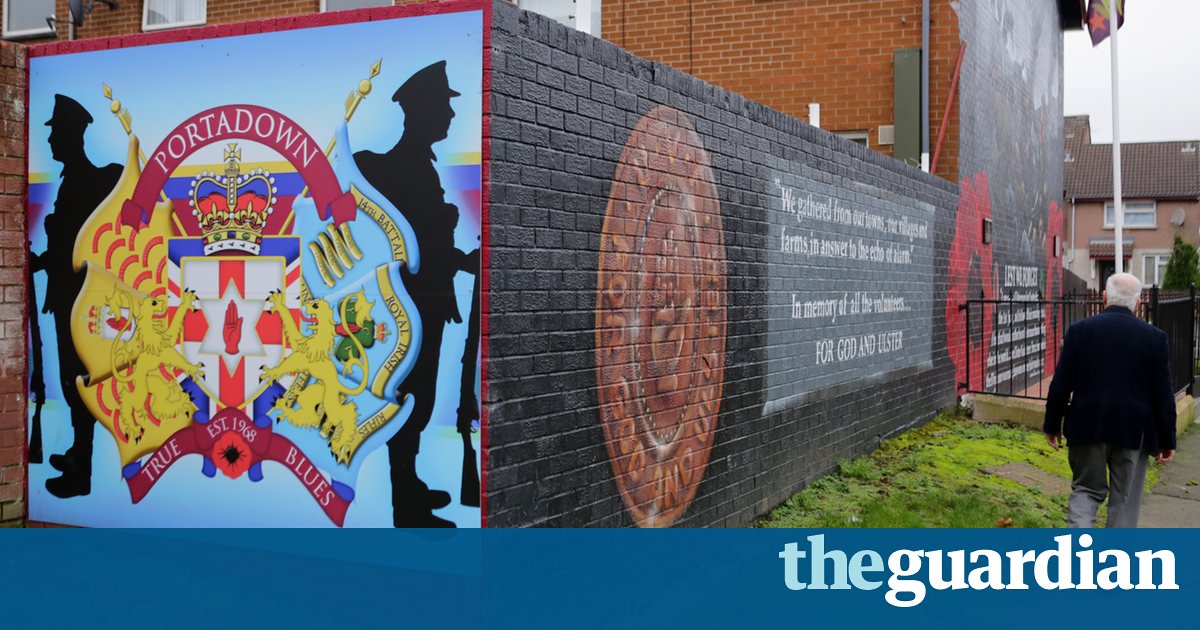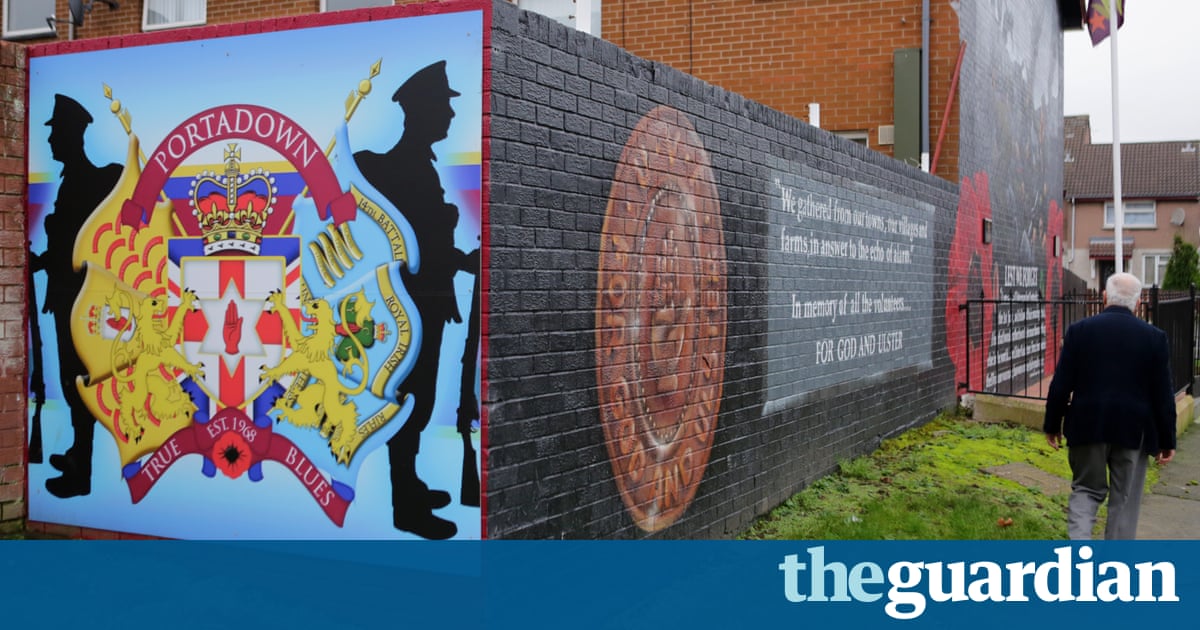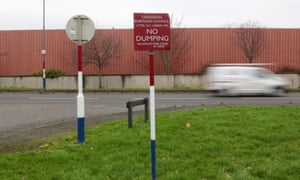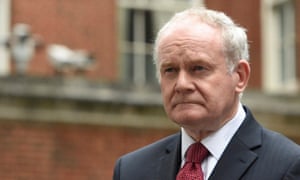Northern Ireland: an uncertain peace

In the week an election was called and Martin McGuinness quit as deputy first minister, a walk through Portadown reveals political and cultural changes that will radically affect the regions political future

The church stands on a lonely eminence on one side of the valley. Across the brook, on the town side, the hilltop has been built up with executive-style houses.
Every Sunday a small delegation of increasingly elderly men, in Orange Order regalia, marches down the hill from the church to the brook. They ask permission to continue along this route into town, from a policeman stationed on the bridge. The policeman politely refuses. They hand him a letter of protest, and then they march back uphill again.
Sometimes the people on the new estates watch this free entertainment, but mostly they never bother. The houses largely comprise young families, barely aware that Drumcree Church was once one of the worlds great flashpoints, and the annual march there from the centre of Portadown was a significant symbol of the power of Northern Irelands Unionist majority. The church, imposing but not beautiful, is, of course, Protestant; the houses, overwhelmingly, belong to Catholics.
The annual July march still takes place, but since the Good Friday Agreement in 1998, the organisers have been barred from using their traditional route back to town. Ulster has had two decades of what outsiders call peace. The worlds media no longer descends on Drumcree; the neighbours feel no fear. But this indicates only an absence of conflict, which is not the same as peace. A truce? I suggested to Richard English, professor of politics at Queens University, Belfast. A sullen truce, he said.
But time is changing the nature of that truce, and the sullenness. The ratio of Protestants to Catholics in Northern Ireland has fallen dramatically: once it was 2:1; at the 2011 census only 48% declared themselves Protestant, with 45% Catholic, creating the near-certainty maybe in four years time that the long-standing majority will cease to exist.Craigavon district, which includes Portadown and has long been regarded as part of the Protestant heartland, is now a dead-heat: 42.1% for both sides. This does not mean a united Ireland is imminent, but it totally changes the dynamics of Ulster politics.
This is the inescapable backdrop to the grubby little scandal cash-for-ash which was ostensibly responsible for the fall of the power-sharing administration this week. Indeed, the combination of incompetence and corruption suggests the Belfast and Dublin governments may already be in step with each other: the Irish Republic has always been a grand place for the elite to cut themselves in on shabby deals; in this case, using well-intentioned environmental subsidies to turn a nice profit.

There is another factor threatening the Protestants control, which was obvious to me within minutes of walking up Portadowns high street for the first time in nine years. There are no longer two parties to the unhappy marriage that defines Northern Ireland: there is a third. The once overwhelmingly white streets of Portadown are full of immigrants: a place in which the problem was that everyone knew far too much local history now has a cohort (thought to be nearing 10%) who know none of it. On the banks of the River Bann, a young Romanian man was fishing. He had never heard the word Troubles.
They come from all over, and are not easily categorised. There are highly qualified migrants working for the pharma firm Almac. Others work at the Moy Park chicken factory. There are South Africans and Filipinos at the hospital. Portadowns halal supermarket has food that ranges from Moroccan to Indonesian; it leaves East European goods to the specialists. Almost next door, Saturnino Neves, the Brazilian barber, cuts all comers hair. Everything good in Ireland, he says.
That is not a universal experience. It was a Yorkshire-born Pakistani who told me with horror about how three locals had barged into a Lithuanian on the street the other day. Locals blame the Portuguese for knife crimes; the east Europeans in general for hoovering up practically every fish in the Bann to sell; and the Romanians for pretty much anything. There is much talk that the migrants slip in through lax Dublin, and cross the border by mini-bus.
In many ways, Portadown (population 22,000) is much like a similar-sized English town of the 1950s: the big chains have not driven the local shops off the high street; property prices are charmingly old-fashioned (four-bed detached with a fine view of Drumcree Church: 185,000); the choice of restaurants is also rather 1950s less charming.
I got chatting to a grey-haired lady at the bus stop. She complained there were already too many chain stores. Anything else changed? There are a lot of new faces about, she said, chuckling at her own discretion. How do the established communities get on with each other these days, I ask. Well, you just go about your business, so you do. And then the bus came to her rescue.

In Portadown the word community is laden with ambiguity. The most prominent charity shop is called Portadown Cares for our community. That means what it would mean anywhere else. But in normal conversation the phrase our community is not necessarily an inclusive one. It means ours, as opposed to anyone elses.
In the early 1970s, especially, Portadown was rife with explosions and shootings, some the result of internal feuds between different Protestant groups. Even now, the town still has five peace walls, which is what you erect when you really, really hate your neighbour. Memories of murder have that effect.
Six months ago, the last Loyalist paramilitary mural left in the town was removed from its prime site along the Corcrain Road and replaced by one memorialising the Ulster forces at the Somme. A government press release hailed it as a turning point for good relations in the area. Not everyone might see it that way. The new mural is beautifully done, but its subtext is fundamentally aggressive and sectarian in a manner that is classically Ulsterish.
Northern Ireland exists as a unit for one reason alone: as a haven for a Protestant community that a century ago was traumatised by the prospect of being absorbed into a Catholic-dominated Ireland. Loyalist, it likes to call itself, though its loyalty to the Crown has always been more transactional than deferential.
Out-competed by the larger size of Catholic families and the arrival ofthe migrants, the Loyalists find themselves bewildered by political developments. Following the resignation of Martin McGuinness as deputy first minister on Monday, they face an unwanted election, widely expected to end in a further stalemate and quite possibly the resumption of direct rule from London.
When McGuinness, visibly ill, retired from politics on Thursday, late-night viewers had to endure a fulsome tribute from Ian Paisley, son of the late Rev Ian McGuinness former deadly foe and then his partner in government in the power-sharing deal that led to them being called the chuckle brothers. One had to pinch oneself to remember that McGuinness is a man believed by everyone in Northern Ireland, except perhaps himself, to have been not just an IRA member but, in the Irish Times words, a ruthless commander of an organisation responsible for some 1,800 killings.
And so no wonder the Orangemen feel disorientated. Many put their faith in Brexit. On a Radio Ulster phone-in this week, I heard elderly listeners exhibiting a version of the East German stalgie, improbable nostalgia for a dreadful past. One caller was demanding the return of the border and those happy days when Northern Ireland was free from guns, explosives and drugs. Oh, yeah.
Brexit may also mean an independent Scotland, the Unionists most natural ally in the UK, which would leave Ulster as an even more isolatedappendage than ever. And hemmed in to the south. In such circumstances, the case against a united Ireland might seem absurd.
But what about the young? Twenty years on from Good Friday, the education system is still largely segregated, and friendships across the traditional divide rare. Noella Murray is the enthusiastic principal of Drumcree College, an old Catholic-run secondary, which is being revamped into St John the Baptists College a junior high school for up to 14s.
This is partly because the old school had been getting indifferent results and partly because parents were put off by the name and the location. In the old days, kids had to remove their ties to get home safely. In the summer, the army would take over the school as their command post to control the march; they are remembered kindly for being fastidious tidiers-up.

The newcomers, with their blank-slate memories, have no qualms, and on Thursday a Syrian girl proudly received her new blue uniform, adding one more element to the rich racial mix. Murray is proud of the schools outreach to Protestants, too. It hosts a multi-faith groupfor drama and has a curricular link with a state-run (ie mainly Protestant) junior high school for sport, health and well-being classes. They have been away on residentials together; social media, she says, allow them to stay in touch. It is no use, she says, to have one joint trip and just get back on the bus.
But she also believes passionately in Catholic education. Sharing is about respecting difference as well as celebrating what we have in common. I hate the word tolerance. I dont believe shared education should be about compromising your ethos and your values.
On the other side of the divide, Darryn Causey is a Democratic Unionist councillor and a youth worker at the YMCA in the Loyalist district of Brownstown. This has never been considered a safe space by traditional Catholic teenagers. But the incomers are not cursed by inhibition. We have one French kid, hes 16, hes very questioning and doesnt understand how it works in Northern Ireland. He said to one boy: What do you mean, youre Protestant? You dont go to church. So he says its not religious, its political. Its a fair point.
Read more: https://www.theguardian.com/uk-news/2017/jan/21/northern-ireland-an-uncertain-peace